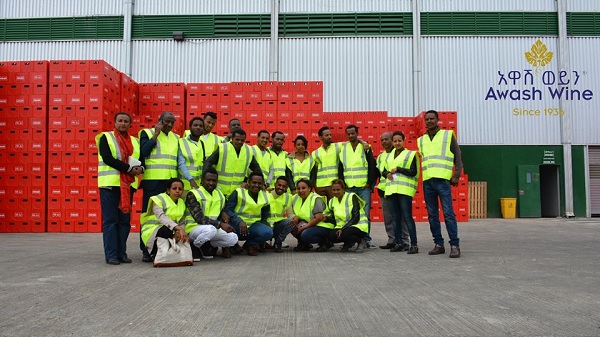
Upon the humanitarian aid delivery Awash Wine Farm Community Development Manager said that the company made the donation as per its Corporate Social Responsibility policy and would continue to do so.
By Desta Gebrehiwot (The Ethiopian Herald)
ARSI ROBE, Ethiopia– Awash Wine Share Company, as part of its Corporate Social Responsibility (CSR), has donated 40 tons of maize and 100 000 Birr for communities displaced from Somali Regional State currently sheltering at Arsi Robe, Oromia Regional State in what the community said others should follow suit to meet their basic demands. The district hosts over 450 displaced people from Jigjiga town and its neighborhoods. The Oromia Regional State government is also providing humanitarian aids like grain, edible oil and other food items. But the displaced community said they have not received adequate support and appealed for more assistance.
Indicating they have been engaged in business activities, some displaced people told The Ethiopian Herald that they seek to return to their previous dwellings if peace and security continue to be fully restored.
The state government is doing everything it can to support the community, said Arsi Robe Woreda Administrator Kasim Ahmed while calling on other organizations to fill the gaps and assist the people and hailing Awash Wine.
Upon the humanitarian aid delivery Awash Wine Farm Community Development Manager Gena Tuji said his company made the donation as per its policy of CRS and would continue to do so.
Meanwhile, Awash Wine is also undertaking various community services activities in Merti Woreda in Arsi Zone, 180km southeast of the capital Addis Ababa, in the Upper Awash Valley where the company’s farm is situated.
According to Gena, besides creating job opportunities for the local community, the company invested 1.5 million birr and installed tap water for the surrendering community. The company is also involved in school and health center expansion.
The company also connected 200 surrounding houses with the main electric grid of the farm. It has also distributed solar panel for about 115 people that have no access to electricity. Sanitary blocks have also been built by the company as part of promoting environmental sanitation.
Source: The Ethiopian Herald
